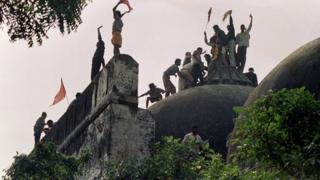 Image copyright
Image copyright
AFP
The dispute reached a flashpoint in 1992 when a Hindu mob destroyed a mosque at the site
A special court has charged senior leaders from India’s ruling party with criminal conspiracy in relation to the destruction of a 16th Century mosque.
Former BJP chief Lal Krishna Advani, veteran leader Murli Manohar Joshi and federal minister Uma Bharti were among those charged in the court on Tuesday.
They deny making inflammatory speeches that encouraged Hindu mobs to tear down the Babri mosque at Ayodhya in 1992.
The riots that followed killed nearly 2,000 people.
Hindus claim the mosque is the birthplace of one of their most revered deities, Lord Ram, and that it was built after the destruction of a Hindu temple by a Muslim invader in the 16th Century.
The Central Bureau of Investigation (CBI) has always said the destruction of the mosque was a planned event.
The special court was constituted after a Supreme Court order in April that said the three must face trial for their alleged role in the destruction of the mosque.
The court added that the trial must be completed within two years, that it would be held on “a day-to-day basis” and that “on no grounds, will it be adjourned”.
All three leaders appeared in court on Tuesday and were told that exemptions from personal appearance would not be allowed under “any circumstances”.
However, they were all granted bail.
Image copyright
Getty Images
Lal Krishna Advani (left) and Uma Bharti (right) have fought the case in the courts for years
The Supreme Court has been hearing the case since 2011 after setting aside a high court judgement which allocated two-thirds of the disputed site to Hindu groups, and the remainder to Muslims.
The Allahabad High Court ruling in 2010 addressed three major issues. It said the disputed spot was Lord Ram’s birthplace, that the mosque had been built after the demolition of a temple and that it was not built in accordance with the tenets of Islam.
For the first time in a judicial ruling, it also said that the disputed site was the birthplace of the Hindu god.
Hindus want a temple built at the site, while Muslims want a new mosque.
Earlier this year, Chief Justice JS Khehar urged the two communities to settle the bitter dispute through negotiations and even offered to act as a mediator between the parties.
The case has already languished in India’s famously sluggish legal system for so long that most of the original petitioners have died.
Ayodhya dispute: India BJP leaders charged with criminal conspiracy}

